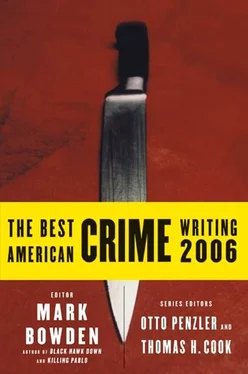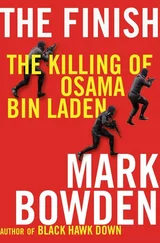Mark Bowden - The Best American Crime Writing 2006
Здесь есть возможность читать онлайн «Mark Bowden - The Best American Crime Writing 2006» весь текст электронной книги совершенно бесплатно (целиком полную версию без сокращений). В некоторых случаях можно слушать аудио, скачать через торрент в формате fb2 и присутствует краткое содержание. Жанр: Детектив, на английском языке. Описание произведения, (предисловие) а так же отзывы посетителей доступны на портале библиотеки ЛибКат.
- Название:The Best American Crime Writing 2006
- Автор:
- Жанр:
- Год:неизвестен
- ISBN:нет данных
- Рейтинг книги:4 / 5. Голосов: 1
-
Избранное:Добавить в избранное
- Отзывы:
-
Ваша оценка:
- 80
- 1
- 2
- 3
- 4
- 5
The Best American Crime Writing 2006: краткое содержание, описание и аннотация
Предлагаем к чтению аннотацию, описание, краткое содержание или предисловие (зависит от того, что написал сам автор книги «The Best American Crime Writing 2006»). Если вы не нашли необходимую информацию о книге — напишите в комментариях, мы постараемся отыскать её.
· Jeffrey Toobin's eye-opening exposé in The New Yorker about a famous prosecutor who may have put the wrong man on death row
· Skip Hollandsworth's amazing but true tale of an old cowboy bank robber who turned out to be a "classic good-hearted Texas woman"
· Jimmy Breslin's stellar piece about the end of the Mob as we know it
The Best American Crime Writing 2006 — читать онлайн бесплатно полную книгу (весь текст) целиком
Ниже представлен текст книги, разбитый по страницам. Система сохранения места последней прочитанной страницы, позволяет с удобством читать онлайн бесплатно книгу «The Best American Crime Writing 2006», без необходимости каждый раз заново искать на чём Вы остановились. Поставьте закладку, и сможете в любой момент перейти на страницу, на которой закончили чтение.
Интервал:
Закладка:
As the fourth day of the manhunt wore on, the killer was still at large and the media were clamoring for answers. Cops from all over the West poured in by the hour. By now, Kueck could have been anywhere-or nowhere. He could have been nailed by a Mojave green-in the summer they were all around, especially the newborns, which were the most lethal. He could have succumbed to hyperthermia, which sets in when you are overheated and you have no water and your temperature spikes to 106 degrees, at which point your brain literally cooks. He could have fallen into a mine shaft. But without his body, there was no way of knowing if the desert had taken Kueck down.
Lake Los Angeles is close to top-secret aeronautical sites such as Plant 42, where the Stealth bomber was developed, and the mysterious Gray Butte, second only to Area 51 in terms of high-tech weirdness, from which Predator drones are launched by night to drag the skies over the Mojave and test the latest surveillance equipment. "We are used to seeing strange things flying above us out here," says Deputy District Attorney David Berger, who had joined the hunt for Kueck. But now, Berger and others noticed a C-130 Hercules flying low over the Antelope Valley, making repeated sweeps, as if probing the desert for the fugitive.
But there was no sign of Kueck until Tuesday afternoon, when a local cop decided to have another look at his trailer. Snakes always return to their lairs, and there it was-a rattlesnake stuck to Kueck's front door, with a knife through its head. Somehow, it seemed, Kueck had survived both the desert and his human hunters, slithering under the crime-scene tape to leave his calling card.
Two days later, Deputy Sorensen was laid to rest at Lancaster Baptist Church. "Greater love has no one than this, that one lay down his life for his friends," said Capt. Carl Deeley, as he eulogized the deputy before Sorensen's family, Gov. Gray Davis, and thousands of spit-shined deputies and cops from all over the country who filled the pews and spilled out onto the somber streets. The grief-stricken cops were uneasy.What if Kueck were hiding somewhere, looking through a rifle scope at the congregation as they laid their fallen deputy to rest? They prayed for their fellow officers who were still out searching for Kueck, wondering why nothing could flush him out, not the bloodhounds, not the two-bit snitches, not the cell-phone signals, not the thermal-imaging helicopters, not even bad luck. They knew that every outlaw in the desert was suddenly living with a proud defiance-one of their own had outsmarted the system. The world was watching, and if Kueck got away, the cops would be nothing.
Then, shortly after the bagpipes sounded and an honor guard placed the deputy's coffin into the hearse for his last ride, they got their break. On Friday, August 8, a signal from Kueck's cell phone was picked up coming from the dilapidated compound where Ron Steres lived. Maybe it was because Kueck's birthday was in two weeks and he couldn't face the idea of another year, or maybe he was just tired of hiding, tired of the whole thing. According to the
Annals of Emergency Medicine, at least ten percent of the shootings involving the Los Angeles County Sheriff's Department are cases of "suicide by cop." If that was the goal, Kueck was about to get his wish.
It was the third time that week that Kueck had shown up to see Steres; a woman who lived in the house next door saw him appear on a bicycle like a desert mirage.This time, though, Steres was gone when Kueck arrived: fearing for his life, he had moved to a local motel. The SWAT team closed in, setting up a perimeter with snipers. It was time for the heavy artillery. A SWAT commander placed a call to L.A. police, requesting the BEAR: the Ballistic Engineered Armored Response, a tactical vehicle that weighs 28,000 pounds and can rapidly deploy up to fifteen cops against urban combatants armed with assault weapons.
Around noon, Detective Mark Lillienfeld called Kueck's daughter on a special cell phone that he gave her the day after Kueck killed Sorensen."Mrs.Welch, get off the phone," he told her."Your father is trying to call you." Detectives had been following every lead, and this one was the strongest-Kueck had been calling her while on the run, strung out and crying and apologizing for never being able to see her again, saying how much he loved her and recounting a bizarre although possible version of the murder in which he had shot the deputy with Sorensen's own gun, suggesting that there was hand-to-hand combat before he opened up on him. "He kept coming," Kueck said,"and I said,'Stop, man, stop.' " Now, in Kueck's last hours,Welch was walking an emotional tightrope, trying to help the sheriff's department and at the same time calm her father down as he threatened to go out like Scarface.
Meanwhile SWAT was closing in, as the radios went berserk with news that the fugitive was cornered. Deputies from three counties burned down the highway, racing toward the site where they joined other law-enforcement personnel and stood arm to arm at the outer perimeter, a human barrier through which no one could escape. With everybody positioned, an announcement was made-"Donald Kueck, this is the Los Angeles Sheriff's Department.We know you are in there. Come out with your hands up."There was no response, no movement. Was Kueck really in there? many of the frazzled deputies wondered. Or had he escaped the noose once again?
At l:20 p.m., Welch got another call. It was her father. He had been trying to contact police on Sorensen's radio. They spoke for a couple of minutes and then Detective Lillienfeld arrived."Dad, the sheriff 's right here," she said. "You talk to him." By now, every satellite van in Southern California was racing toward the scene.
A twenty-five-year veteran of the department, Lillienfeld is a self-effacing guy with a quiet and soothing voice-one that may have provided Kueck with a few moments of grace before he went up in flames. Kueck seemed most concerned about returning to prison. "Once I get in there," he told Lillienfeld, "those Asian doctors are worse than Mengele."
"We got all kinds of doctors in there," Lillienfeld told him. "Why don't we let you see some non-Asian doctors?"
For the next several hours, as Kueck tried to recharge his faltering cell-phone battery with the one in Sorensen's radio, there were dozens of calls made back and forth from Lillienfeld to the staging area at Mount Carmel to SWAT in the field. At one point Kueck told Lillienfeld to wait while he took a leak; at other times he rambled about dirt bikes, his back pain, suicide, taking cops down with him. At another point, in the middle of it all, he choked up and asked Lillienfeld not to tell his mother, in her late seventies and unaware of her son's situation.
At 3:30 p.m., Sheriff Lee Baca stepped out of an Air 5 chopper and was escorted to a bank of microphones to address the news media. He gave an assessment of the situation and the suspect, and ended the press conference with a terse summation: "We're down to what's known in this business as dead or alive."
As SWAT commanders positioned the BEAR and set up a tactical plan, Lillienfeld tried one last time to get Kueck to surrender.
"We'd like to kind of resolve this thing before it gets dark out," he said. Kueck replied that he did not want to get arrested or killed before sundown. "Nobody wants to kill you," Lillienfeld said.
At 5:26, the loudspeaker began blaring-"Donald Kueck, come out with your hands up." A half-hour later, the first round of tear gas was deployed, quickly followed by a second. As the gas billowed through the main compound, Kueck called Lillienfeld and claimed to be in the bushes, daring him to "send in the dogs."
SWAT launched another volley of tear gas and the BEAR moved in for the kill, obliterating sheds as it barreled toward the main compound. Kueck opened up with his automatic, spraying the giant assault vehicle with gunfire. Air 5 and 6 hovered over the sheds as fires broke out in one shed, then two, then a third, as Kueck-perhaps shot himself-darted in and out of the flames, blasting rounds. By 8:45, the entire compound was on fire, and the fire grew and as the moon appeared above the Mojave, it became a conflagration with giant freak-show flames that scorched the heavens, and some wondered if it was the Twilight of the Gods, and the news choppers came to the fire like mechanical moths, relaying the image to millions who watched the flames dance on television, the phony hearth that interrupted regular programming with coverage of the End. Around the perimeter of Kueck's last stand, hundreds of deputies and law-enforcement personnel watched the grisly bonfire burn and wondered if they had finally got him.A few miles away at Mount Carmel, the nuns watched the flames in the distance and prayed.
Читать дальшеИнтервал:
Закладка:
Похожие книги на «The Best American Crime Writing 2006»
Представляем Вашему вниманию похожие книги на «The Best American Crime Writing 2006» списком для выбора. Мы отобрали схожую по названию и смыслу литературу в надежде предоставить читателям больше вариантов отыскать новые, интересные, ещё непрочитанные произведения.
Обсуждение, отзывы о книге «The Best American Crime Writing 2006» и просто собственные мнения читателей. Оставьте ваши комментарии, напишите, что Вы думаете о произведении, его смысле или главных героях. Укажите что конкретно понравилось, а что нет, и почему Вы так считаете.












